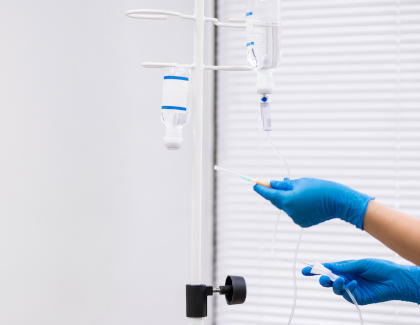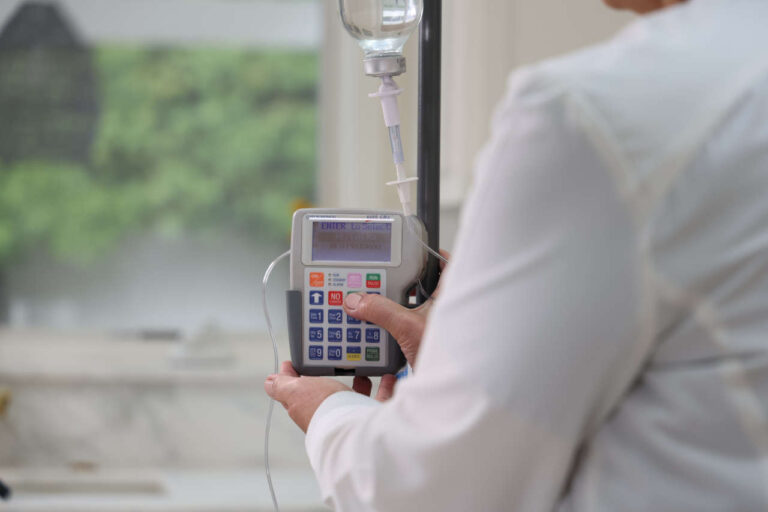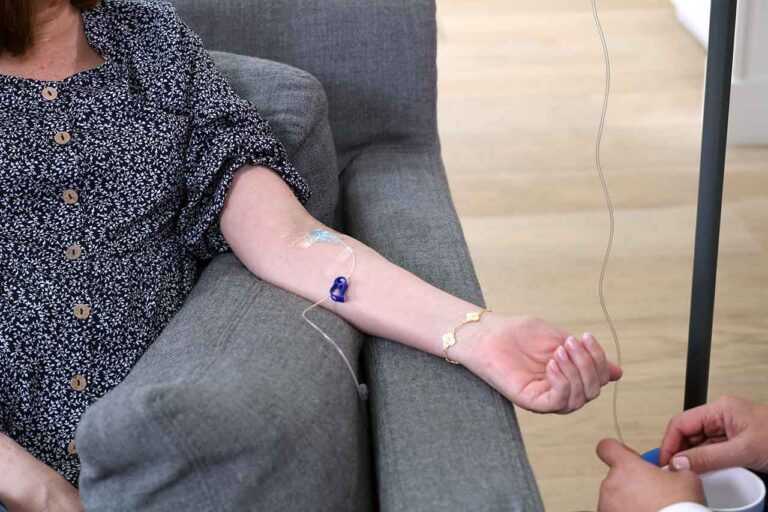
IVIG or intravenous immunoglobulin is a pooled plasma-derived human product that contains antibodies obtained from thousands of healthy donors. It is an intravenous drug therapy that helps boost the immune response and treats various diseases, like autoimmune conditions, immunodeficiency diseases, and neurodegenerative disorders.
Treatment Info
Get IVIG Prior AuthorizationIVIG has also been shown to benefit those with Alzheimer’s disease (AD), a progressive neurodegenerative disorder, and the most common form of dementia. The exact mechanism and treatment approach of IVIG for Alzheimer’s disease is still being researched. But as IVIG possesses anti-inflammatory and immunomodulatory properties, it may alleviate Alzheimer’s by modulating the immune response against the disease and reducing brain-related inflammation.
The prevalence of Alzheimer’s disease and other dementias is rising rapidly and is expected to hit 130 million people by 2050. Hence, the development of novel treatment options is becoming a necessity. In this article, we will discuss how IVIG therapy works for Alzheimer’s disease.
What Is Alzheimer’s Disease and How Does It Occur?
Alzheimer’s disease is a progressive brain disorder characterized by a decline in memory, behavior, thinking, and social skills. It is the most common reason for memory loss.
Alzheimer’s disease is caused by the abnormal buildup of proteins called beta-amyloid plaques and tau tangles in and around the brain cells. The buildup of proteins activates some immune and regulatory cells, like astrocytes and microglia in the brain.
The activation of these cells initiates the immune response to destroy clusters of abnormal proteins by stimulating a release of inflammatory-producing molecules such as chemokines and cytokines. Eventually, the immune response may dysregulate and cause neuroinflammation, or inflammation of the brain and nervous tissue.
The Role of IVIG In Alzheimer’s Disease
IVIG is made of a concentrated formulation of natural human-derived antibodies that helps:
- Stimulate the immune system
- Reduce inflammation
- Target the abnormal clusters of beta-amyloid protein to promote its clearance from the brain
How IVIG Works To Treat Alzheimer’s Disease
Research on how IVIG works for Alzheimer’s disease is still ongoing. However, the mechanisms of IVIG understood up until now include:
Modulation of the Immune System
To fight any disease or illness, our body must produce healthy antibodies to kill the foreign substance or antigen. In Alzheimer’s disease, the major foreign substance is beta-amyloid aggregation and tau tangles that need to be cleared. As IVIG contains a concentrated range of antibodies, it helps activate the immune response to clear the abnormal buildup of proteins in the brain cells.
Anti-inflammatory Effects
Neuroinflammation or inflammation in the brain is a common clinical manifestation of Alzheimer’s disease. The release of pro-inflammatory molecules is a part of the immune response, but it can lead to neuroinflammation. Chronic inflammation in the brain may cause neuronal damage and a decline in cognitive functions, worsening the disease.
IVIG possesses anti-inflammatory properties, hence, it helps reduce proinflammatory molecules, which ultimately decreases inflammation. Moreover, the anti-inflammatory effects of IVIG help preserve cognitive functions and neuronal decline.
Speak to a Specialist
About Copay AssistanceRemoval of Beta-Amyloid Plaques
The antibodies present in IVIG bind to beta-amyloid protein and help potentiate its removal from the brain. With the clearance of beta-amyloid from the brain, IVIG decreases the burden of abnormal protein accumulation, which helps slow down the progression of the disease.
Cognitive Improvement
By strengthening the immune system with healthy concentrated human-derived antibodies, IVIG works to treat Alzheimer’s disease by activating the immune response and promoting the clearance of beta-amyloid protein. The combination of IVIG effects improves overall cognitive functions and neuronal damage.
Research on IVIG for Alzheimer’s Disease

A clinical trial was conducted to study the effects of three kinds of IVIG named, IVIG-A, IVIG-B, and IVIG-C. The three kinds of IVIG were obtained from separate manufacturers located in north, northwest, and south China respectively. Moreover, the plasma donors of the manufacturers were also different in geography, ethnicity, race, and diet.
The results showed that IVIG-A and IVIG-C were significant in inhibiting the secretion of pro-inflammatory molecules, while the therapeutic effect of IVIG-C was the best compared to all three. IVIG-C improved cognitive decline, and pathological alterations, and also decreased proinflammatory molecules. This was the first study that reported different neuroprotective effects from different manufacturers. Hence, it is possible that differences in outcomes of IVIG may be related to the manufacturers, batches, and the donors themselves.
Another study was conducted to determine the effects of a short course of IVIG for Alzheimer’s disease in patients with mild cognitive impairment. Intravenous immunoglobulin (0.4 g/kg) was given to 50 patients aged 50-84 years every 2 weeks for a total of 5 infusions. The results revealed a reduction in brain atrophy in patients within 12 months compared to control groups. But after 24 months the reduction no longer met the desired therapeutic levels. This shows that IVIG delays cognitive decline and dementia in patients with mild cognitive impairment for at least 1 year, but the effects of IVIG may decline within 2 years.
Limitations of IVIG for Alzheimer’s Disease
With the potential benefits of IVIG for Alzheimer’s disease, the therapy also possesses some limitations and challenges, which include:
High Cost and Inaccessibility
As IVIG is a specialized human-derived intravenous product that is obtained from several healthy donors, the therapy is expensive and sometimes inaccessible for many patients. Easy availability and affordability remain an obstacle to IVIG treatment.
Variations of IVIG Preparations
IVIG is a complex mixture of antibodies. Hence, its composition can vary with different manufacturers and batches, which can make it challenging to determine the optimal dose and treatment duration for each patient that is required for an effective treatment.
Limited Evidence
As research and study on IVIG for Alzheimer’s disease is still in progress, there is limited evidence on the overall efficacy and outcomes of the therapy. Some studies have shown positive outcomes, but further large-scale randomized control trials need to be done to establish the long-term benefits and efficacy of IVIG for Alzheimer’s disease.
Future Directions of IVIG for Alzheimer’s Disease
IVIG holds promising benefits for Alzheimer’s disease. However, to overcome the limitations of the therapy, it is crucial to address the knowledge gaps, identify specific antibodies responsible for producing effects, and establish innovative delivery methods to administer IVIG therapy.
Consult an IVIG Specialist
The Best IVIG Home Infusion | Get IVIG Treatment AssistanceSide Effects of IVIG
Side effects of IVIG may occur during and after the therapy. Common side effects include:
- Headache
- Tiredness
- Cold symptoms
- Muscle aches/joint pain
- Fever/chills
The rare side effects of IVIG include:
- Blood clots
- Severe allergic reactions (anaphylaxis)
- Acute kidney failure
- Hemolytic anemia
- Aseptic meningitis













